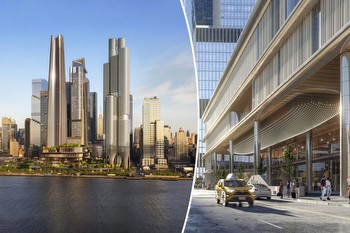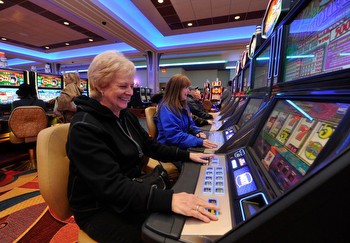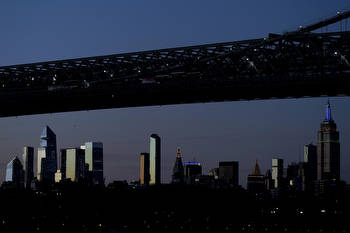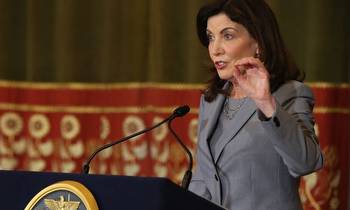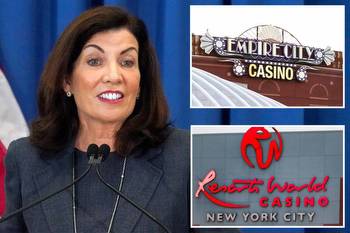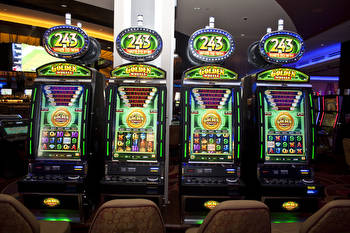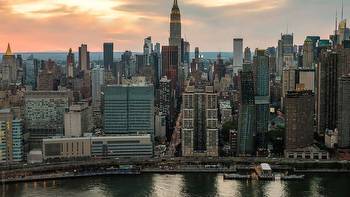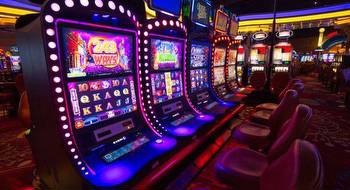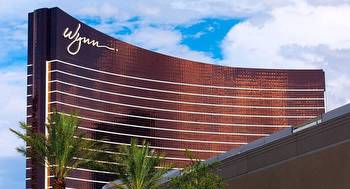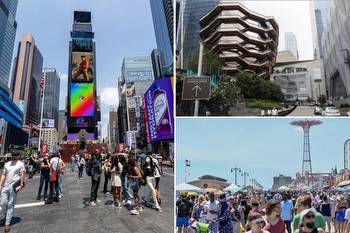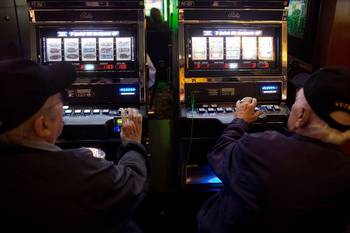5 things to know about 3 casinos that may be headed to NYC area
NEW YORK — Whether New Yorkers are ready or not, casinos will soon be coming to the New York City area.
Precisely how soon and how many remains to be determined. What we know is that in April, New York state approved the issuance of three new casino licenses intended for the area.
Technically, one or more of the licenses could be issued to a casino operator in another part of the state, but they are widely expected to go to the downstate region.
The state legalized casinos in 2013, but effectively agreed not to place any in the downstate region until 2023. Gov. Kathy Hochul and the state Legislature wanted to move faster and included a provision in the recently passed budget to advance the timeline.
The effort was partly the product of a lobbying effort by, among others, the Hotel and Gaming Trades Council, along with seven gambling companies who are spending some $300,000 a month.
But before any new bricks are laid or chips are played, a lengthy, gnarly process awaits, involving a telescoping series of bureaucracies, including the New York State Gaming Commission, the Gaming Facility Location Board and a still-to-be-determined number of community advisory committees.
Will New York City get all three casino licenses?
Probably not.
MGM’s electronic gambling facility in Yonkers, just north of New York City, is thought to be one of two locations with a leg up in the process, along with the Resorts World facility at the Aqueduct Racetrack in Queens. Both are already home to “racinos” — horse racetracks that have expanded to include casino-like properties, but with video lottery terminals, not table games.
Given their long-standing community and political relationships and preexisting infrastructure, they are considered to be favorites for two of the three licenses.
There is a strong possibility that the third would be in Manhattan. While the prospect of a Manhattan casino has bewitched developers from Hudson Yards to the East River, winning permission from local politicians is still considered a heavy lift.
Other parts of the city are also in play, including neighborhoods in Queens and Brooklyn.
Who is expected to bid for a casino?
MGM and Genting, which operate the two racinos in the area, are hoping to upgrade their facilities in Yonkers and Queens to full-scale casinos.
The competition for the presumptive third license is a free-for-all. The matchmaking between real estate developers and casino operators eager to take part in a bid is something like speed dating — with casino operators freely consorting with several developers.
Among those who have considered participating are developers like SL Green, Related Companies, Vornado Realty Trust in Manhattan and the Citi Field owner, Steven Cohen, in Queens. Joseph J. Sitt, the chairman of Thor Equities, is also planning a bid for a site on Coney Island.
There will also most likely be bids from Long Island.
The field of casino operators eyeing the opportunity includes Bally’s Corp., Las Vegas Sands and Hard Rock, which just opened a hotel in midtown Manhattan.
How does the selection process work?
If the bureaucracies were a Russian nesting doll, the biggest, outermost doll would be the New York State Gaming Commission.
The commission will have a say on who gets the three new licenses and where the new casinos will be situated, but others will have a voice, too.
The first step is for the commission to fill a five-member Gaming Facility Location Board. Its responsibilities include creating and managing the application process for casino developers and recommending the winners. State law requires that at least three members be in place by Oct. 6. Once that occurs, the commission will have 90 days to issue requests for applications for the casino licenses.
The applications will then be reviewed by the location board, which will make a final recommendation to the Gaming Commission. The commission’s makeup would seem to give Hochul some control. All seven members are appointed directly by the governor, one on the recommendation of the New York State Assembly, and another on the recommendation of the New York State Senate.
But the Gaming Commission cannot overrule the location board, unless it finds a problem with the fitness and character of the applicant, the commission said.
And before any vote is taken, separate six-person community advisory committees will also have a chance to weigh in. In New York City, two of those members will be designated by the governor and the mayor. The other four will be local representatives of the City Council, Assembly, Senate and borough president. Those committees will consider the relevant application, with a two-thirds majority required for passage.
Approval by the community advisory committee is a prerequisite for a license, giving the committee power to quash an application before it ever gets to be considered by the Gaming Commission.
Hasn’t the casino market become oversaturated?
A glut of casinos unquestionably exists in the United States, as well as a wealth of other gambling options, and that has put a damper on economic projections for many new casinos.
But New York City is different.
It is affluent, it is dense and any casino here is likely to be successful — albeit at the possible expense of nearby gambling locales, like Atlantic City, New Jersey.
“You have access to a huge local population that already has been fueling a lot of gaming revenue for a couple decades now in the broader geographic region, but it’s also a huge international destination as well,” said Colin Mansfield, an analyst at Fitch Ratings.
For further evidence, look no farther than Resorts World at Aqueduct, which despite having no table games like blackjack or roulette, claims to be both “the highest-grossing slots casino in the world” and “the largest single property taxpayer in New York state.”
What other hurdles will a casino operator have to overcome?
In order to put a casino anywhere in New York City, a developer may have to persuade the New York City Council to rezone the land in question, according to the New York State Gaming Commission.
At present, land regulations in New York City do not allow casinos. But that may not be a blanket prohibition: The commission has yet to determine if the state-owned land at the Aqueduct, in Queens, or the land near Penn Station (which the state plans to redevelop using a process that typically overrides local land-use regulations) would require rezoning.
At sites where rezonings are necessary, developers can expect a monthslong process at minimum. If they can secure the zoning approval and the go-aheads from the community advisory board and Gaming Commission, they will then have to pay at least a $500 million license fee to the state.








